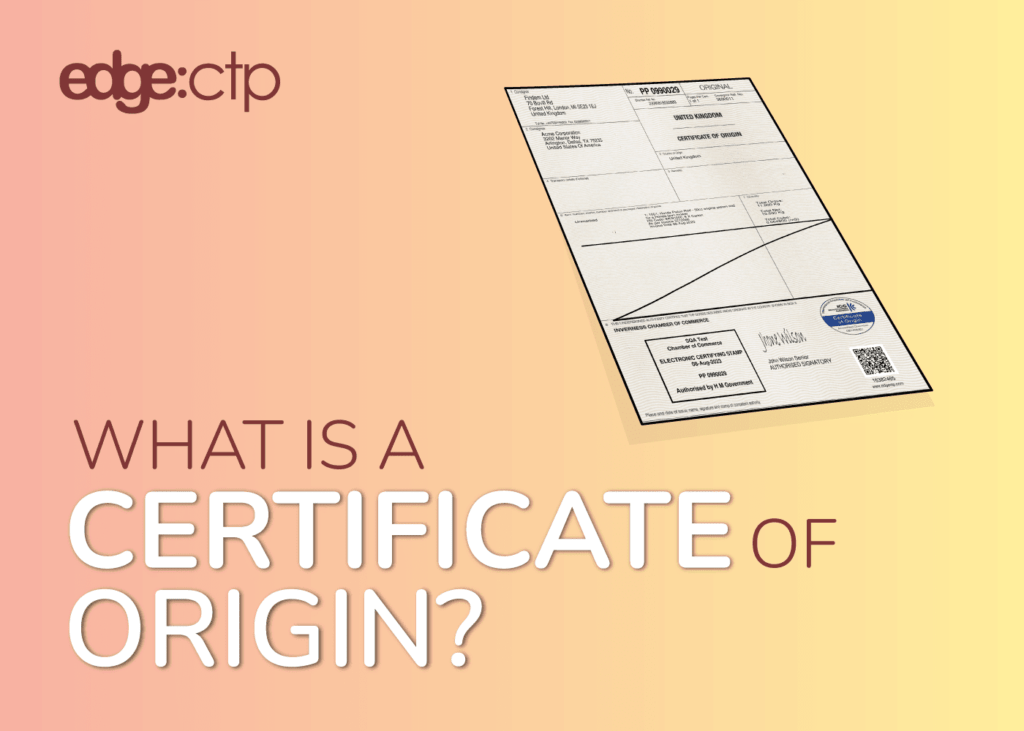Understanding Certificate of Origin (CO): Definition and Types
A certificate of origin (CO) is an official document that specifies the nation in which a commodity or item was produced. The certificate of origin provides details on the goods, including their intended destination and the country from which they are being exported. For instance, a product might be labelled “Made in the USA” or “Made in China.”.
The CO, which is required by a number of treaty agreements for international trade, is crucial in determining whether specific items are eligible for import and whether they are subject to duties.
Here's an overview of the Certificate of Origin (CO):
- What is a Certificate of Origin (CO)?
- The Purpose of a Certificate of Origin
- Types of Certificate of Origin
- The Importance of Certificate of Origin in International Trade
- How to Obtain a Certificate of Origin
- Common Mistakes to Avoid When Dealing with Certificate of Origin
- The Role of Certificate of Origin in Customs Clearance
- Importance of a Certificate of Origin in Customs Clearance:
- Process of Certificate of Origin in Customs Clearance:
- Recent Changes and Developments in Certificate of Origin Requirements
- The Future of Certificate of Origin in Global Trade
- Conclusion
What is a Certificate of Origin (CO)?
A Certificate of Origin (CO) is an official document used in international trade to certify the country of origin of a product. It is a crucial document that provides information about where a product was manufactured, produced, or processed. The CO is typically required by customs authorities in the importing country to determine the eligibility of the product for preferential treatment under trade agreements or to assess duties and tariffs.
Authorised organisations such as chambers of commerce, trade associations, or other governmental bodies issue COs. To make sure the declared country of origin is accurate, these organisations check the information that the exporter provides. There are two main types of COs: non-preferential and preferential.
- Non-preferential Certificate of Origin: This type of CO is used to certify the origin of goods without any specific trade agreement benefits. It is generally required for customs clearance and to comply with trade regulations.
- Preferential Certificate of Origin: A preferential CO is used to certify the origin of goods that are eligible for preferential treatment under a trade agreement, such as reduced tariffs or duty-free entry. It proves that the goods meet the rules of origin specified in the trade agreement.
Having a valid Certificate of Origin is crucial for exporters to ensure smooth customs clearance and trade facilitation. It helps to establish the authenticity of the product's origin and can provide cost-saving benefits through preferential trade agreements. Make sure to understand the specific requirements of COs for your products and target markets to avoid any delays or issues in your international trade transactions.
The Purpose of a Certificate of Origin
A Certificate of Origin serves as a crucial document in international trade, affirming the origin of goods being exported. It clarifies where the products come from and demonstrates that they originate from a specific country. The primary purpose of a Certificate of Origin is to meet the customs and import requirements of the importing country. Here are the main reasons why a Certificate of Origin is essential:
- Customs Requirement: One of the key purposes of a Certificate of Origin is to comply with the customs regulations of the importing country. Customs authorities use this document to ascertain the origin of the goods and apply the appropriate tariffs and trade measures.
- Preference Programmes: Some countries or trading blocs have trade agreements or preference programmes in place that offer reduced tariffs or other benefits for goods originating from specific countries. A Certificate of Origin is necessary to qualify for these preferential treatments.
- Consumer Confidence: Consumers are increasingly conscious of the products they purchase and often prefer goods from certain regions known for their quality or ethical standards. A Certificate of Origin can provide assurance to consumers about the authenticity and quality of the products.
- Trade Data and Statistics: Certificates of Origin are valuable for governments and organisations to track and analyse trade data. They provide insights into the flow of goods between countries, aiding in the development of trade policies and strategies.
In summary, a Certificate of Origin plays a vital role in facilitating international trade by verifying the origin of goods, meeting customs requirements, enabling eligibility for preferential trade programmes, boosting consumer confidence, and contributing to the collection of trade data.
Types of Certificate of Origin
When it comes to Certificate of Origin documents, there are several types that serve different purposes and cater to various trade agreements and regulations. Here are some common types of certificates of origin:
- Ordinary Certificate of Origin: This is the most standard type issued by chambers of commerce and serves as a declaration that goods exported are wholly obtained, produced, manufactured, or processed in a particular country.
- Preferential Certificate of Origin: This type is essential for shipments that qualify for preferential treatment under various trade agreements, like Free Trade Agreements (FTA). It allows goods to benefit from reduced or eliminated duties when exported to countries with which the agreement is in place.
- Non-Preferential Certificate of Origin: Unlike preferential COs, this type doesn't provide any special treatment or tariff preferences. It simply verifies the origin of goods without conferring any specific duty benefits.
- Blanket Certificate of Origin: This type covers multiple shipments of the same product over a specified period. It reduces the administrative burden of issuing a separate CO for each transaction, saving time and effort.
- Specific Certificate of Origin: This document pertains to a single shipment of goods and is specific to that particular consignment. It is necessary when exporting one-off or limited-quantity shipments.
Understanding the differences among these types of Certificates of Origin is crucial for exporters to ensure compliance with trade regulations and benefit from any applicable trade agreements or preferences.
The Importance of Certificate of Origin in International Trade
I believe that the Certificate of Origin (CO) is a crucial document in international trade for several reasons:
- Customs Clearance: When I receive goods from another country, customs require a Certificate of Origin to verify the origin of the products. This document helps customs officials apply the correct tariffs and taxes based on trade agreements between countries.
- Compliance: Having a Certificate of Origin ensures that I am compliant with international trade regulations. It provides proof that the goods being imported or exported meet specific criteria, such as rules of origin under free trade agreements.
- Quality Assurance: The CO can also serve as a quality assurance document. It guarantees that the products originated in a specific country, assuring buyers of the product's authenticity and quality.
- Preventing Fraud: By verifying the origin of goods, the Certificate of Origin helps prevent fraud and misrepresentation in international trade. This document reduces the risk of counterfeit products entering the market.
- Facilitating Trade: The CO facilitates smoother trade transactions by providing necessary information to customs authorities. It streamlines the customs clearance process, reducing delays and ensuring the efficient movement of goods across borders.
In conclusion, the Certificate of Origin plays a vital role in international trade by ensuring compliance with regulations, facilitating customs clearance, and providing assurance of product quality and authenticity.
How to Obtain a Certificate of Origin
I'll guide you through the process of obtaining a Certificate of Origin:
- Contact the Chamber of Commerce: The local Chamber of Commerce is usually the designated authority to issue Certificates of Origin. I recommend reaching out to them to understand their specific requirements and procedures.
- Gather Required Documentation: Prepare all necessary documents, such as commercial invoices, bills of lading, and any other supporting paperwork that may be needed for your specific situation.
- Complete the application form. Fill out the Certificate of Origin application form accurately and thoroughly. Ensure all information provided is correct to avoid delays or rejections.
- Submit the Application: Once you have completed the form and gathered all required documents, submit your application to the Chamber of Commerce. Some chambers may accept online submissions for convenience.
- Pay the Fees: There may be fees associated with obtaining a Certificate of Origin. Make sure to inquire about the cost and payment methods accepted by the Chamber of Commerce.
- Wait for Processing: The processing time for a Certificate of Origin can vary. Be patient and stay in contact with the Chamber of Commerce if you have any questions or need updates on the status of your application.
- Receive the Certificate: Once your application is approved, you will receive the Certificate of Origin. Make sure to check all details on the certificate for accuracy before using it for international trade purposes.
Obtaining a Certificate of Origin may seem daunting at first, but by following these steps and staying organised throughout the process, you can successfully obtain the necessary documentation for your international trade transactions.
Common Mistakes to Avoid When Dealing with Certificate of Origin
I have dealt with Certificate of Origin documentation numerous times, and through my experience, I have learned to avoid certain common mistakes that can cause delays or issues. Here are some key mistakes to steer clear of:
- Incomplete Information: When filling out a Certificate of Origin, ensure all required fields are completed accurately. Missing information can lead to rejection or delays in the processing of the document.
- Incorrect Product Description: Providing an inaccurate or vague description of the product can raise red flags. Be specific about the goods being exported to avoid confusion.
- Incorrect Country of Origin: It's essential to correctly identify the country where the goods were produced. Mistakes in this section can result in customs delays or even rejection of the certificate.
- Using Outdated Templates: Always use the latest version of the Certificate of Origin form. Using an outdated template may lead to non-compliance with current regulations.
- Failure to Obtain Signatures: Make sure the authorised personnel have signed the Certificate of Origin. Unsigned documents are considered invalid and can cause issues during customs clearance.
- Not Providing Supporting Documents: Depending on the destination country, additional documents may be required to accompany the Certificate of Origin. Failure to provide these documents can result in rejection.
- Lack of Awareness of Regulations: Stay updated on the regulations pertaining to certificates of origin for different countries. Ignorance of specific requirements can lead to mistakes in the documentation.
By being mindful of these common mistakes, I have been able to streamline the process of dealing with Certificate of Origin documentation and ensure smooth export operations.
The Role of Certificate of Origin in Customs Clearance
When it comes to customs clearance, the Certificate of Origin (CO) plays a crucial role in verifying the origin of goods. This document certifies that the products being imported or exported originate from a specific country or region.
Importance of a Certificate of Origin in Customs Clearance:
- Verification of Product Origin: Customs authorities use the CO to verify the origin of the goods and ensure they comply with trade agreements and regulations.
- Determination of Tariffs: The information on the CO helps customs officials determine the correct tariff rates applicable to the imported goods.
- Prevention of Fraud: By providing accurate information about the origin of the products, the CO helps prevent fraud or incorrect classification of goods.
- Compliance with Trade Agreements: Many countries require a CO to take advantage of preferential trade agreements or to qualify for lower tariffs.
Process of Certificate of Origin in Customs Clearance:
- Submission: The exporter submits the CO along with other shipping documents to the customs authorities.
- Verification: Customs officials verify the information on the CO to ensure accuracy and compliance with regulations.
- Clearance: Once the CO is verified, the customs clearance process can proceed, allowing the goods to enter or leave the country smoothly.
In conclusion, the Certificate of Origin is a vital document in the customs clearance process, ensuring that the origin of goods is accurately documented and helping facilitate international trade transactions.
Recent Changes and Developments in Certificate of Origin Requirements
As I navigate the world of international trade, staying updated on the latest changes and developments in Certificate of Origin (CO) requirements is crucial. Here are some recent updates you need to be aware of:
- Digitalization: One significant trend in CO requirements is the shift towards digitalization. Many countries are now accepting electronic Certificates of Origin, streamlining the process and reducing paperwork.
- Harmonisation: There is a growing effort to harmonise CO requirements across different countries and trade agreements. This standardisation simplifies the process for exporters and helps ensure compliance with various regulations.
- Increased scrutiny: With a focus on preventing fraud and ensuring accuracy, authorities are paying closer attention to CO documentation. This means exporters must be meticulous in providing accurate information and supporting documentation.
- Special trade agreements: Some countries have specific trade agreements that impact CO requirements. It's essential to stay informed about these agreements and any special provisions they may have regarding CO issuance.
- Environmental considerations: In line with global efforts to promote sustainability, some countries are incorporating environmental provisions into their CO requirements. Exporters may need to provide additional information related to the environmental impact of their products.
Staying informed about these recent changes and developments in CO requirements is key to navigating the complexities of international trade successfully. By keeping abreast of these trends, exporters can ensure compliance, minimise delays, and maintain smooth operations in their global trade ventures.
The Future of Certificate of Origin in Global Trade
I believe that the future of Certificates of Origin (CO) in global trade is poised for substantial transformation. With the continued digitalization of trade processes, Certificates of Origin are likely to become increasingly digitised and integrated into electronic platforms. This shift towards electronic issuance and verification of COs will significantly streamline the process, reduce paperwork, and minimise the chances of errors or fraud.
- Enhanced Efficiency: Moving towards electronic COs will undoubtedly lead to enhanced efficiency in the issuance, verification, and sharing of these essential trade documents. The automation of CO processes will save time and resources for businesses engaged in international trade.
- Improved Transparency: Digitising Certificates of Origin will improve transparency in trade transactions. By having a clear digital trail of the issuance and verification of COs, stakeholders can ensure the authenticity and accuracy of the documents more easily.
- Integration with Trade Platforms: I anticipate that COs will become seamlessly integrated into existing trade platforms and systems. This integration will facilitate smoother cross-border trade by enabling real-time verification of COs and reducing delays in customs clearance procedures.
- Blockchain Technology: The adoption of blockchain technology in trade finance and supply chain management is likely to impact the future of Certificates of Origin. Blockchain can offer enhanced security, immutability, and decentralisation, making the verification of COs more secure and reliable.
In conclusion, the future of Certificates of Origin in global trade is evolving towards digitalization, automation, and increased transparency. Embracing these technological advancements will undoubtedly enhance the efficiency and trustworthiness of CO processes in the dynamic landscape of international trade.
Conclusion
Throughout this article, I have delved deep into the intricacies of a Certificate of Origin (CO), understanding its definition, significance, and various types. We explored how CO serves as a crucial trade document, providing vital information about the origin of goods being exported. Moreover, we discussed the different types of CO, including non-preferential CO and preferential CO, each designed for specific trade agreements and purposes.
I highlighted the importance of accurately completing a CO to avoid any delays or penalties in international trade transactions. By understanding the purpose of CO and determining the correct type needed for a particular export, businesses can ensure smooth customs clearance and compliance with trade regulations.
Additionally, we examined the differences between self-certification and certification by authorities in issuing a CO, emphasising the importance of adhering to the specific requirements of each country or trade agreement. This ensures the credibility and acceptance of the CO by relevant authorities.
Remember, when dealing with international trade, understanding the nuances of the Certificate of Origin is paramount. It is not just a piece of paper; it is a crucial document that facilitates global trade by certifying the origin of goods. By being well-informed about CO, businesses can navigate the complexities of international trade more effectively and build trust with their trading partners.



